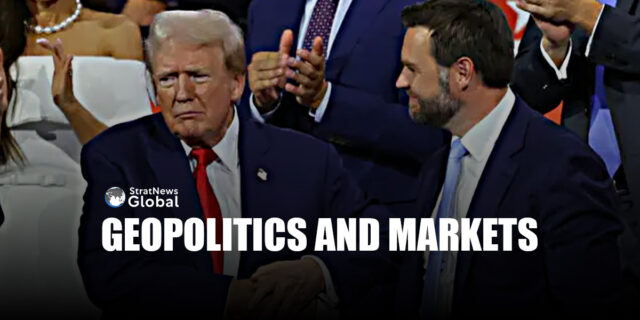Geopolitical concerns are increasingly influencing global market sentiment. It seems politics has toppled global markets from record peaks and over a turbulent few weeks stepped to the fore as investors confront the prospect of an increasingly fractious Europe, isolationist America and a slowdown in the pulse of world trade.
Geopolitics topped the risk list of sovereign money managers this year and, after a roaring rally, money is rushing out of potential flashpoints – such as Taiwan’s stock market – and into havens such as gold, which hit an all-time high last week.
The line of thinking is that a period of peace and free trade is finished and the next one looks less profitable.
Nearly half the globe votes this year and results so far underpin the shift in mood: Taiwan elected a president detested in Beijing, voters lurched to the right in France and installed the largest left-wing majority in Britain for a generation.
Over just eight days, the U.S. campaign trail created shock waves: frontrunner Donald Trump was grazed by a bullet and Joe Biden quit with less than four months to go until polling day.
Markets are tuning in and the news has pulled geopolitical concerns to the front of investors’ minds.
“It is definitely one of the more important considerations we have been working into our process all year,” said Erik Knutzen, multi-asset chief investment officer at Neuberger Berman, which manages $481 billion in assets.
“The high-level way that that is being manifested is by assessing our overall portfolio risk levels,” he said.
“An environment of elevated geopolitical risk would lead you to turn that risk dial down.”
That has already been evident in prices as markets immediately focus on two potential pitfalls likely to be heightened by a Trump victory: inflation and restrictions or disruptions to semiconductor sales, particularly for Taiwan.
Gold, considered an inflation hedge and a beneficiary of demand from central banks in a climate of mistrust, shot to a record high above $2,450 an ounce in the days after the attempt on Trump’s life, an event that has galvanised his supporters.
“All of Trump’s policies are likely to be inflationary – be it tax cuts, immigration, or re-shoring, and hence dollar bearish…so the dollar is likely to depreciate against gold,” said Prashant Kothaari, CEO at Alpha Alternatives.
At the same time more than $100 billion has been wiped from the market value of Taiwan Semiconductor Manufacturing Co in less than a week after Trump sounded equivocal about his commitment to Taiwan’s protection and chip industry.
Goldman Sachs’ cross-strait risk indicator, which analyses news, is below peaks but has rebounded over the past week.
Taiwan’s currency slumped to its lowest in more than eight years on Monday as investors fled the island which is at the forefront of chipmaking technology and the front line of U.S.-China tension.
“The return of this geopolitical risk has effectively blunted enthusiasm for the AI hardware trade,” said Norman Villamin, chief strategist at Union Bancaire Privée.
Thirty eight years in journalism, widely travelled, history buff with a preference for Old Monk Rum. Current interest/focus spans China, Technology and Trade. Recent reads: Steven Colls Directorate S and Alexander Frater's Chasing the Monsoon. Netflix/Prime video junkie. Loves animal videos on Facebook. Reluctant tweeter.





